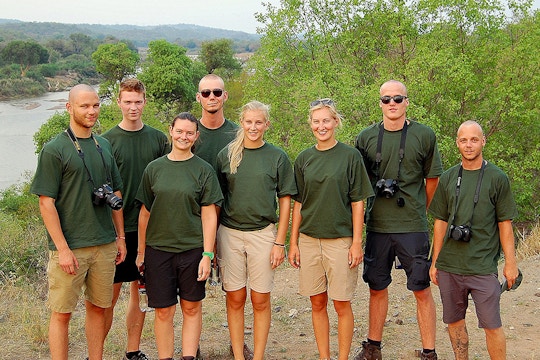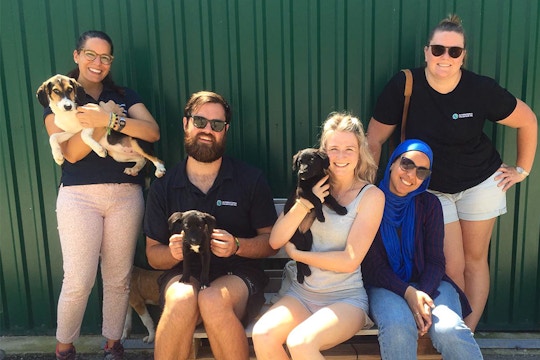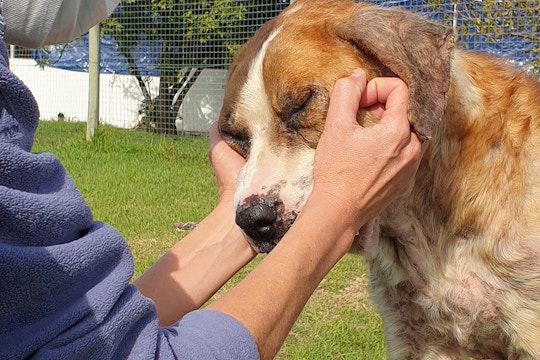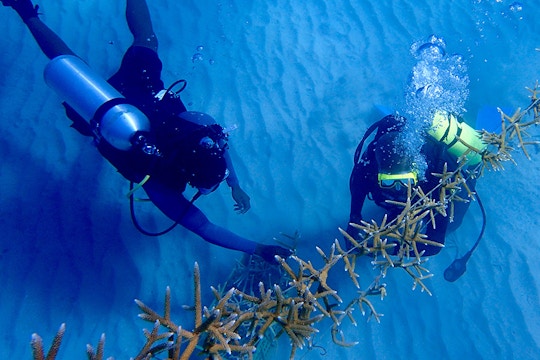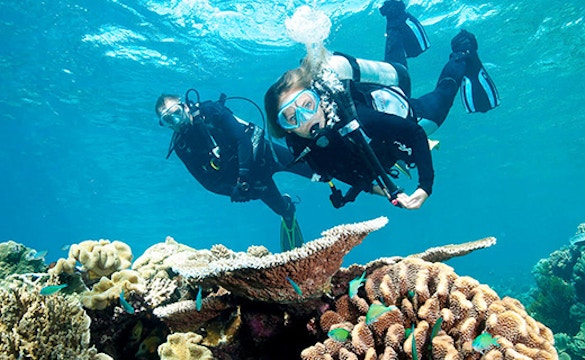
Turtle and Coastal Conservation in Zanzibar
Love the sea and want to be a Turtle and Coastal Conservation volunteer in Zanzibar? International Volunteer HQ’s Turtle and Coastal Conservation project is a great way for volunteers to gain experience and learn about the challenges of protecting wild turtles and coastal ecosystems. Volunteers will spend time on the beach, assisting biologists with turtle egg relocation and may get the chance to release baby turtles after hatching. Volunteers also help monitor a coral reef, provide environmental education to local kids and tourists, learn about local sustainability issues, and can get involved with coral farming.
Highlights:
- Programs start every Wednesday
- Affordable fees from $635 for 1 week
- Includes accommodation, meals, airport pick up, orientation and 24/7 support
-
Help protect turtles and their coral reef habitats
-
Explore the stunning natural environment of Zanzibar
-
Stay with other volunteers in a coastal conservation camp near Matemwe
Key information
This program is ideal for:
What to expect and how you'll make an impact
Matemwe is home to some of Zanzibar’s finest beaches. With white sand that seems to glow day and night, it is a popular tourist destination. Volunteers have the opportunity to work alongside local marine biologists to help boost wild turtle populations and protect the coastal environment.
As a Turtle & Coastal Conservation volunteer you’ll be volunteering at the Matemwe Marine Turtle Hatchery and staying at a coastal conservation camp just 15 minutes away. The hatchery was established to protect the marine life in the North East of Zanzibar. The turtles are released into the ocean immediately after birth, as they develop their sense of orientation and other critical ocean survival skills soon after their birth.
Volunteers will also be assisting with coral reef monitoring by snorkeling, community environmental education, and activities addressing Zanzibar’s waste problem as waste is eventually ending up in the ocean where it imposes a threat to marine turtles and other sea animals.
You can also be part of coral farming activities (please note that a scuba diving certification is needed for this activity - for volunteers taking part for longer than one week you can join a 3 day PADI Open Water course on-site).
Volunteers will be involved in tasks such as:
- Spotting turtle nests as part of early morning beach patrols
- Assisting local biologists with the location and relocating the eggs
- Releasing baby turtles into the ocean*
- Assisting with coral reef monitoring and restoration (PADI Open Water dive certification required)
- Educating the local community and tourists about conservation
- Beach clean-ups and recycling/upcycling
- Assisting at a community waste collecting point
- Joining educative session about Environmental Conservation once per week and completing small related research projects
- Assisting with growing fruits and vegetables for the volunteer’s own consumption, using permaculture techniques and learning other skills for sustainable living
*Volunteers need to be aware that while turtles are released into the ocean immediately after birth we cannot guarantee that this will happen during a volunteer’s time on the program.
Why do Turtle and Coastal Conservation volunteering in Matemwe with IVHQ?
As a Turtle and Coastal Conservation volunteer in Zanzibar you’ll be adding value to the local community, while also developing personally and professionally by:
- Protecting and boosting turtle populations in Matemwe
- Developing your communication skills
- Gaining turtle knowledge and experience
- Learning about marine conservation and preservation
- Exploring Zanzibar and its amazing beaches
Volunteer requirements
- Volunteers under the age of 16 must be accompanied by a parent or guardian to participate in this program
- Volunteers aged 16-18 are required to provide IVHQ with parental consent in order to participate on the program, and may be asked to provide additional documentation to the local team
- All volunteers aged 13+ are required to provide a criminal background check to IVHQ prior to departure. Those aged 13-17, if unable to obtain a criminal background check, can provide two character reference letters instead
- All volunteers are required to have adequate volunteer travel insurance
- All volunteers must speak fluent English.
Are you eligible to volunteer?
Submit a free application so we can confirm your eligibility and check availability for your preferred dates.
Apply For FreeNot sure which program to join?
Zanzibar photo gallery











































Academic course credit
Gain course credit from your college or university and meet your academic requirements when completing a volunteer abroad program with International Volunteer HQ!
Learn about course credit”I had such an amazing and incredible experience with IVHQ and I look forward to more volunteer trips with them in the future! The coral and seaweed farming activities as well as spending time with the local kids were my favourite moments of the volunteer experience. I came home with several habits that I plan to keep to minimize my impact on planet earth. I ...” read more
Read reviews from Turtle and Coastal Conservation volunteers in Matemwe
See more reviews
Location
The Marine Turtle Hatchery is based at Matemwe, a village on the north-eastern coast of Zanzibar. Volunteers are accommodated at a coastal conservation camp located 15 minutes away from the hatchery. Some of the project work is based on the beach where the camp is situated, such as beach clean ups. With spectacular beaches and a coral reef, there is plenty of fishing, snorkeling, diving, sightseeing and relaxing to be done in this area.
Arrival and orientation
Volunteers need to arrive in Zanzibar on their Wednesday start date and their orientation will take place on the Wednesday afternoon and/or the following day.
After you have registered for the program, please book your flights to arrive at Abeid Amani Karume International Airport (ZNZ) in Zanzibar. Your airport pick-up is included in your Program Fee. We recommend that volunteers under the age of 18 travel internationally with a notarized letter from their parents to support their documentation.
When you arrive, you will be greeted at the airport by a member of the local team and transported to the volunteer accommodation. Your accommodation is covered by your Program Fee and includes the Wednesday night before your Thursday program orientation. If you are traveling in Tanzania prior to your volunteer program, we can arrange for you to be picked up in Zanzibar on your start date.
Orientation is hosted by our local team at the volunteer accommodation. Orientation begins on the Wednesday afternoon and/or the Thursday morning after your chosen start date. Orientation covers everything you need to know for your volunteer program in Zanzibar – an introduction to Zanzibar, Zanzibar customs, rules and expectations, language lessons (Kiunguja), safety, travel opportunities in Zanzibar, and an introduction to your project and placement. The orientation will also give you a chance to meet other volunteers.
Volunteer schedule example
First Day
On the first day of the volunteering placement, you will be escorted to the project by our local staff and introduced to the staff at the placement you will be working with.
Weekdays - A typical day would be as follows:
| 6:30 - 7:30 AM | Beach patrol |
| 8:00 AM | Breakfast at camp |
| 8:30 AM | Volunteers begin work for the morning |
| 1:00 - 2:00 PM | Lunch at camp or at project site |
| 2:00 PM | Volunteers resume work for the afternoon |
| 7:00 - 8:00 PM | Dinner at camp |
Weekends
Volunteers have free time on the weekends and are able to make the most of the gorgeous beaches, explore Zanzibar’s historic Stone Town or other towns, shop for souvenirs, or enjoy a range of adventure and outdoor activities including snorkeling, diving, swimming, wildlife viewing and fishing. If you’re staying for a while you may also like to fly back to mainland Tanzania or other parts of Africa where you can go on safari or otherwise explore.
Accommodation and WiFi
Volunteers on the Turtle and Coastal Conservation project stay in semi-permanent fully furnished tents in a camp located 3 minutes walk from the beach. This camp is 15 minutes away from the turtle hatchery, where some of the volunteer work takes place (although some volunteer work also takes place at the camp, such as beach clean ups).
You can expect to share with 1 to 3 other volunteers. When possible tents are separated by gender, however cannot always guarantee this separation due to varying occupancies and booking situations. Volunteers need to be prepared for times where there may be no electricity as supply can sometimes be disrupted on the island.
Bedding is provided, however you will need to bring your own towel and biodegradable toiletries. Biodegradable shower gel is provided in the shower blocks, as the greywater is used for watering the garden. Please note, because of this volunteers should not bring shampoos/shower gels that are not biodegradable. The camp has cooks, housekeepers, maintenance staff and watchmen. The program and support team are also available on a daily basis during the week for support and via phone over the weekend.
If you would like to keep connected during your stay, free WiFi is provided and volunteers will be able to connect in most areas of the camp. Volunteers can also bring an unlocked mobile phone and the local team will provide you with a local SIM card at your orientation and assist you to set it up.
If you would like to arrive a day earlier than your recommended arrival date, or wish to spend a few extra nights after finishing your program, we can arrange extra nights of accommodation for you for $29 (approximately $29) per person, per night on the Turtle and Coastal Conservation project. Meals are included, and extra nights are subject to availability. There is an additional surcharge attached when volunteers need airport pick-up earlier than their Wednesday start date.
If you would like to arrange extra nights of accommodation, just make a note in your application or contact your IVHQ Program Manager who will be happy to assist you.
Meals
Zanzibar’s cuisine varies across the island, owing to the difference in produce inland and along the coast. The immigration of Khoja Indians has resulted in local dishes influenced by Indian cuisine. Staple foods in Zanzibar include rice, chapati and coconut milk.
Volunteers are served three meals per day in a buffet style, which is a mix of local and Western food. Breakfast includes toasted bread with jam and vegetables such as tomatoes or avocado, olive oil, fruit, eggs, filtered drip coffee, tea and cereals.
Lunch and dinner are usually plain rice or pilau rice (which in Zanzibar includes cardamom, cinnamon and cloves), pasta, french fries with meat or vegetables (usually carrot, potatoes, peas, okra) typically cooked in a coconut sauce that contains some herbs and spices. Meals are 70% vegetarian and 30% meat/fish based with healthy nutrition and sustainability factors considered in the meal plan and sourcing of the food ingredients.
Please note that while the local team can cater for vegetarians, they are not able to cater to other special dietary requirements or requests, you should not expect to eat as you normally do at home and there is the need to be flexible or prepared to supplement the food provided. If supplementing food, volunteers must note that the kitchen is not available for volunteer use but there is a mini fridge available for shared volunteer use in each tent.
A drinking water filter machine is available at the accommodation and to help reduce plastic trash volunteers are asked to bring a refillable drinking bottle.
























Pricing
Duration |
Program FeeDue 30 days before you start, or within 48 hours if you register inside of 30 days. Covers the cost of hosting you.
|
|---|---|
| 1 week | $635 Equivalent to $91/day |
| 2 weeks | $890 Equivalent to $64/day |
| 3 weeks | $1,145 Equivalent to $55/day |
| 4 weeks | $1,400 Equivalent to $50/day |
| 5 weeks | $1,655 Equivalent to $47/day |
| 6 weeks | $1,910 Equivalent to $45/day |
| 8 weeks | $2,420 Equivalent to $43/day |
| 10 weeks | $2,895 Equivalent to $41/day |
| 12 weeks | $3,335 Equivalent to $40/day |
- Accommodation
- Meals
- 24/7 in-country support
- In-country program orientation
- Pre-departure support from your Program Manager
- Airport pick-up
- Personalized preparation tools, guides and check lists
- Access to IVHQ’s preferred insurance and flights partners
- Discounts on travel and tour add-ons
- Certificate of International Volunteer Service
Learn more about what's included in your IVHQ Registration Fee and Program Fee.
- All programs attract a Registration Fee of US$329 (approximately $329) in addition to the Program Fee. This covers all pre-departure support services.
- A 5% international banking fee is added at point of payment.
- Additional things to budget for include: Visa, flights, travel insurance (mandatory), vaccinations and criminal background check.
- Please note: Volunteers staying for 2 weeks or more will need to budget US$200 to obtain a work permit.
- Recommended spending money: Volunteers in Zanzibar generally find US$50-75 per week to be sufficient for expenses.
Check what's required to visit Zanzibar
Check out the widget below to find out what the Covid-19 restrictions and visa requirements are for Zanzibar, based on your country of residence.

Safety and support
IVHQ follows best practice and industry-leading health and safety procedures, which are regularly reviewed and optimized as part of the B Corporation recertification.
- All volunteers encouraged to complete our interactive pre-departure training.
- All local teams trained on best practice volunteer management & First Aid.
- All IVHQ programs are required to adhere to IVHQ's Risk Management Policy.
- All volunteers have access to 24/7 in-country support from our local team.
Essential country information
| Capital | Dodoma |
| Population | 58 million |
| Languages | Swahili and English |
| Currency | Tanzanian Shilling (TZS) |
| Time zone | UTC+03:00 |
Weather and climate
Zanzibar follows very similar weather patterns to that of mainland Tanzania but is always a little more humid and warm weather should be expected all year round. The island’s rainy season runs from March through May when humidity is high and afternoon downpours are common. The dry season occurs from June through October and rain is infrequent. During November and December there’s another short rainy season followed by a short dry season across January and February.
Latest blog posts
Other projects you may be interested in


